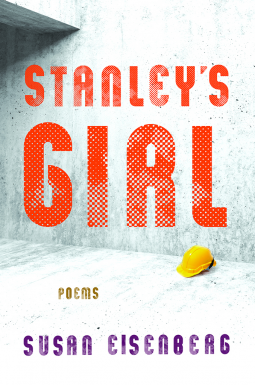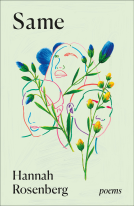
Stanley’s Girl
Poems
by Susan Eisenberg
This title was previously available on NetGalley and is now archived.
Send NetGalley books directly to your Kindle or Kindle app
1
To read on a Kindle or Kindle app, please add kindle@netgalley.com as an approved email address to receive files in your Amazon account. Click here for step-by-step instructions.
2
Also find your Kindle email address within your Amazon account, and enter it here.
Pub Date May 15 2018 | Archive Date May 15 2018
Cornell University Press | ILR Press
Talking about this book? Use #Stanley’sGirl #NetGalley. More hashtag tips!
Description
The fiercely lyrical poetry of Stanley’s Girl is rooted in Susan Eisenberg’s experience as one of the first women to enter the construction industry and from her decades gathering accounts of others to give scaffolding to that history. Eisenberg charts her own induction into the construction workplace culture and how tradeswomen from across the country grappled with what was required to become a team player and succeed in a dangerous workplace where women were unwelcome. The specifics of construction become metaphor as she explores resonances in other spheres—from family to other social and political issues—where violence, or its threat, maintains order. Prying open memory, her poems investigate how systems of discrimination, domination, and exclusion are maintained and how individuals and institutions accommodate to injustice and its agreed-on lies, including her own collusion. Poems in this collection probe workplace-linked suicide, sexual assault, and sometimes-fatal intentional accidents, as well as the role of bystander silence and the responsibility of witness.
Advance Praise
"Stanley's Girl
shows us once again that Susan Eisenberg is one of our most powerful
voices writing poetry about working life. She draws us into her
experiences as a pioneering woman in a male-dominated profession with
the authority of a survivor and the eyes and ears of an experienced
poet."
- Jim Daniels, author of The Middle Ages
- Eleanor Wilner, author of Tourist in Hell
Available Editions
| EDITION | Other Format |
| ISBN | 9781501719707 |
| PRICE | $14.95 (USD) |
| PAGES | 78 |
Links
Featured Reviews
 Terri D, Reviewer
Terri D, Reviewer
Stanley's Girl by Susan Eisenberg is a collection of poetry that comes from a unique perspective--a woman working in the construction industry before women had any place there. Although a couple of poems stray from being specifically about construction, the majority of the collection deals with all of the pain, fear, and heartbreak that had to be endured just to be seen as qualified to step foot on a construction site.
The poetry gets very serious by tackling all of what you would expect a woman to have to endure being one of the few to get the ball rolling, such as blatant misogyny, hazing, harassment, and even assault in some instances. What may come as a surprise is the blatant disregard for human life simply because someone isn't the same as all the others, to the point where seeing if a woman is going to make a fatal mistake becomes a spectator sport. Very powerful collection.
 Nathaniel D, Media/Journalist
Nathaniel D, Media/Journalist
Wow, what a powerful collection of poetry, and from a unique perspective, which made the reading all the more compelling. Stanley's Girl is a collection of poetry dealing with being a woman working in construction and all of the horrific sexism, abuse, and constant danger that comes with that. Every poem hit home with great power, particularly the titular poem, about an experience with a co-worker who was a wonderful help but also a terrible racist.
 Taryn V, Reviewer
Taryn V, Reviewer
Fully formatted review available at : https://www.goodreads.com/review/show/2265936083
I don't typically read poetry, but I was eager to read about a new-to-me topic: women in the construction industry. In these poems, Susan Eisenberg tells the stories of the women and people of color who entered an industry that didn't want them.
Eisenberg entered the construction industry in 1978. In the early 1980s, she became "one of the first women in the country to achieve journey-level status in the International Brotherhood of Electrical Workers (IBEW)." At that time ≈2% of building trade jobs were held by women; that number has held steady throughout the decades.* Reading this book of 44 poems felt like reading a journal. The emotional impact far exceeds its 84-page length. I felt so much rage while reading about what people endured while simply trying to earn a living. There were repeated appeals from bosses and 'sympathetic' bystanders to ignore threatening behavior. A man urinates on a woman's car, yet she's the unhinged one for confronting him. People were put in dangerous—sometimes fatal—situations to either teach them a lesson or for company entertainment.
She recognizes the additional hardships faced by people of different races and ethnicities,"all the undercurrents and sideshows" that she was previously unaware of ("White Joe Miller and Black Joe Miller"). In Part III, she examines issues faced by women in other male-dominated industries, such as the standard of medical care for female veterans. After decades of being issued ill-fitting prosthetic feet designed for men, a prosthetic foot was finally designed for women in 2015. Some of the poems address Eisenberg's personal life, such as a poem about a harrowing childhood that in some ways prepared her for the challenges ahead ("Navigating Uncertainty") and a poem about the time she was stalked and confronted about one of her poems ("Poems About Gaza by Jews" with the repeated refrain "he found me").
Other memorable poems:
"Welcome" - All the extra knowledge that had to be learned, far beyond the scope of the actual job.
"Introductions" - The consequences of asserting oneself on the construction site.
"Below the Radar" - A variation of the "twice as good" saying.
"Troublemaker" - The neverending list of all the things a woman should’ve done to avoid negative consequences or escape judgment. (Spoiler alert: There's nothing she could've done.)
"The Jobsite Marksman" - "He'll swear he slept through high school. Lie! In History he took careful notes, then machine-cut keys to the tenderspots:"
"Go-Getter" - At the risk of losing her job, a single mom/ironworker apprentice is forced into a fatal situation.
"Power" - A black woman is excited to be offered an onsite opportunity beyond making coffee and sweeping, but the crew had ulterior motives.
The pioneering people in these poems took their place on the frontlines in hopes that future generations wouldn't have to fight so hard. It's important to hear their stories because as time passes and situations improve even slightly, there's a tendency to forget about how hard people had to fight to get to that point or why laws were enacted. These poems are also a reminder of all the work that’s still left to do. This book mostly deals with events that happened from the late 1970s to the late 1990s, but the issues addressed are not just in the past. Anyone who has ever been an outsider in a workplace will be able to see their own experiences in these poems.
Susan Eisenberg also wrote Pioneering: Poems from the Construction Site. If you are interested in the topic but aren't really into poetry, she wrote the oral history We’ll Call You If We Need You: Experiences of Women Working Construction(1998). The introduction (available on Google Books) provides interesting context and makes me want to read more.






